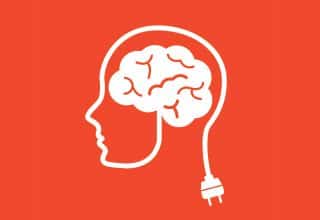1. Better Brain Function
 Your brain does its best work when your potassium level is maintained. Go a long time without enough potassium and your brain could end up paying the price. It’s best to avoid the situation altogether by ensuring you’re getting adequate potassium.
Your brain does its best work when your potassium level is maintained. Go a long time without enough potassium and your brain could end up paying the price. It’s best to avoid the situation altogether by ensuring you’re getting adequate potassium.
In order to get the best and most noticeable results, try to get the recommended amount of potassium each day, which is 3.5 grams. It may involve cutting out processed food and stressing fresh fruits and vegetables, but it’s worth the effort and will pay dividends in the form of better brain health.
How Potassium Helps: Potassium helps send more oxygen to your brain, which lets it do its job better. When you don’t get enough you’re limiting the amount of oxygen that makes it to your brain and you’ll experience the side effects, which may be subtle at first but will worsen until the problem is corrected.
2. Better Muscle Function
Your muscles do a lot to help you get through your day, and if they’re not firing on all cylinders it’s going to be hard to get through your daily activities without feeling fatigued. Whether you’re trying to build lean muscle mass or just trying to keep your muscles healthy for life, potassium plays a role.

One symptom of low metabolism is muscle weakness and damage, so in order to keep your muscle as healthy as possible, look to foods that are high in potassium, and stock up on them each time you’re at the grocery store. These include bananas of course, as well as avocados, raisins, and dried apricots.
How Potassium Helps: Potassium helps keeps your muscles healthy by working at the cellular level to repolarize the cells of your muscles, helping to repair them faster and more efficiently.
3. Lower Risk of Heart Problems
Taking in a sufficient amount of potassium will put you at a lower risk of developing heart problems like stroke and heart disease. If you’ve already been diagnosed with a heart problem, you’ve likely been told to watch your level of potassium.
What’s interesting is that many of the foods that are rich in potassium also contain antioxidants and other minerals that will help your heart and lead to greater overall healthiness. To complete your heart health profile be sure you’re getting adequate amount of exercise each day, such as a walk, strength training, or yoga.
How Potassium Helps: Your cardiovascular system benefits from reduced blood pressure, which puts less strain on the arteries and heart. In their more relaxed state, your heart and arteries can function better, resulting in more energy in the present, and a longer life going forward.
4. Maintains Fluid Balance
 Getting enough potassium each day helps keep your internal fluids balanced correctly. Potassium is just one part of the equation, and you’ll want to make sure you’re getting all of your important minerals to maintain a balance of electrolytes in your bloodstream.
Getting enough potassium each day helps keep your internal fluids balanced correctly. Potassium is just one part of the equation, and you’ll want to make sure you’re getting all of your important minerals to maintain a balance of electrolytes in your bloodstream.
You’ll want to watch how much sodium you’re taking in, since many of the foods found in restaurants, fast food joints, and pre-packaged foods contain a lot of low-grade salt. Making your own food gives you control over how much sodium it contains. Calcium is another mineral to watch in order to maintain a healthy fluid balance in the body.
How Potassium Helps: Potassium, as well as calcium and sodium help make up the electrolyte balance in the body. Drinking enough water is essential for the right fluid balance, and you’ll want to determine the right amount of water for your body size and weight and be sure to drink it daily.
5. Stronger Bones
Potassium is one key to the healthy bone puzzle that you don’t want to forget. Calcium generally gets the most attention when it comes to essential minerals for bone health, but you’ll need to keep an eye on more than just one, including potassium.
The body is a system of complex subsystems all working together to keep you moving. Bones don’t rely on just one mineral, but an array of vitamins and minerals in order to thrive. You probably don’t pay much attention to your bones until they start having problems, so it’s best to be proactive and help them stay healthy long before any problems arise.
How Potassium Helps: Along with calcium, phosphorous, manganese, and other key minerals, potassium works to keep your bones strong and healthy. Bones need the right minerals in order to continue to stay hard and prevent diseases like osteoporosis, making potassium a very beneficial item indeed.
6. Reduced Stress Levels
We could all use a little less stress in this modern world of ours, and a proper potassium level is key to handling the triggers of everyday life. You may not even notice when you’re low on potassium and it’s causing excess stress because it may seem normal to you now, or you may have labeled yourself as a stressful person.

Because potassium is used by every cell in your body to continue on with its function, it only stands to reason that when you’re not getting enough you won’t be able to cope as well with stress.
How Potassium Helps: Potassium benefits you by keeping your stress down and helping to regulate your blood pressure. You’d be surprised at how much less stressed you’ll feel when your blood pressure is at a healthy level. It also helps to relax your muscles, which keeps you from tensing up and exacerbating the situation.
7. Improved Blood Pressure Numbers
High blood pressure is definitely something to be concerned about, and there’s a reason why your doctor checks it each time you go in for a check-up. Getting the right amount of potassium each day will help lower your blood pressure, and should be used in conjunction with a blood pressure conscious diet and lifestyle.
There are several serious conditions that high blood pressure is a precursor for, including heart attacks, strokes, and diabetes. Don’t leave yourself susceptible to these potentially life-ending conditions. Focus on your potassium intake until it becomes a habit.
How Potassium Helps: Potassium relaxes blood vessels, allowing blood to flow more freely and bringing down your blood pressure. Of course it is not the only factor in keeping your blood pressure where it needs to be, so consult with your healthcare professional to discuss diet and lifestyle changes you can make to keep it in a healthy range.
8. Increased Metabolism
 Potassium helps knock out a sluggish metabolism and gets it back on track to natural levels of effectiveness. If you’ve ever had trouble losing weight while dieting, it could have been due to a slow metabolism brought on by, or worsened by, low potassium levels.
Potassium helps knock out a sluggish metabolism and gets it back on track to natural levels of effectiveness. If you’ve ever had trouble losing weight while dieting, it could have been due to a slow metabolism brought on by, or worsened by, low potassium levels.
Getting enough potassium sets the stage for other minerals to do their job. Think of the vitamins and minerals you take in each day as a team designed to help you perform at your best. In order for the team to work properly, each team member must show up and do their job. Miss one component and it all works inefficiently and tends to break down.
How Potassium Helps: Potassium helps the body break down and metabolize foods by helping the other minerals you take in do their job. It’s a team player that is a vital component to your body’s metabolism.
9. Improved Nervous System
Your nervous system benefits greatly from regular consumption of foods rich in potassium. You may not be able to spot this benefit when you start getting more potassium, but running a shortage of potassium will produce symptoms that are identifiable.
This is a complex system that is responsible for sending signals throughout your body, and helping you interact with the world around you. It’s not something we generally give much attention to, and if you treat it right with adequate potassium from the foods you eat, it will treat you better in return.
How Potassium Helps: Potassium gets your nervous system to function the way it should by helping the tissues in your body on a cellular level. When your nervous system is happy, you’ll find that your health and wellbeing improve over time.
10. Prevents Muscle Cramps
One sign that you might be low on potassium is that your muscles are cramping for no apparent reason. If you’ve overused a muscle and it cramps up on you, that is understable, and may not be the result of too little potassium. But if you experience muscle cramps in muscles that haven’t been pushed to their max, you may want to put some attention on your potassium intake.
Muscle cramps may not be a huge problem, but preventing them with potassium is easy enough. Muscle cramps and twitches can also be used as an early sign that your potassium levels are low. Take action to correct this imbalance and you should see an improvement in symptoms.


 Your brain does its best work when your potassium level is maintained. Go a long time without enough potassium and your brain could end up paying the price. It’s best to avoid the situation altogether by ensuring you’re getting adequate potassium.
Your brain does its best work when your potassium level is maintained. Go a long time without enough potassium and your brain could end up paying the price. It’s best to avoid the situation altogether by ensuring you’re getting adequate potassium.


 Potassium helps knock out a sluggish metabolism and gets it back on track to natural levels of effectiveness. If you’ve ever had trouble losing weight while dieting, it could have been due to a slow metabolism brought on by, or worsened by, low potassium levels.
Potassium helps knock out a sluggish metabolism and gets it back on track to natural levels of effectiveness. If you’ve ever had trouble losing weight while dieting, it could have been due to a slow metabolism brought on by, or worsened by, low potassium levels.